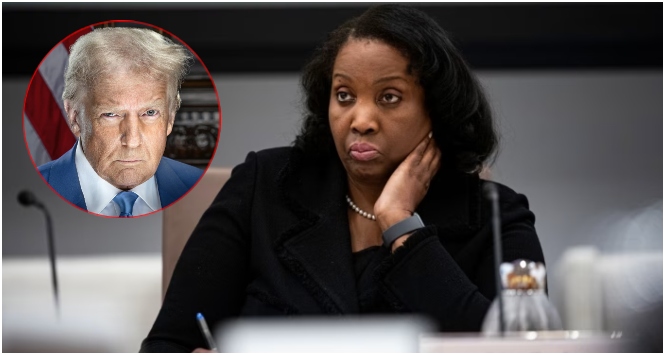Federal Reserve Governor Lisa Cook, the first Black woman to serve on the Fed’s Board of Governors, is preparing to mount a legal challenge after President Donald Trump attempted to fire her on Monday night — an action her attorney argues is without precedent and without legal basis.
On Tuesday, August 26, Cook’s attorney, Abbe Lowell, announced that he will file suit to contest the removal effort. “President Trump has no authority to remove Federal Reserve Governor Lisa Cook. His attempt to fire her, based solely on a referral letter, lacks any factual or legal basis,” Lowell said in a statement to CNN.
Trump’s letter to Cook cited “gross negligence in financial transactions” as justification, but Cook has not been charged with any wrongdoing. She responded defiantly Monday evening, stating:
“President Trump purported to fire me ‘for cause’ when no cause exists under the law, and he has no authority to do so. I will not resign. I will continue to carry out my duties to help the American economy as I have been doing since 2022.”
The Legal Stakes
The case sets up an extraordinary confrontation over the scope of presidential authority and the independence of the Federal Reserve. Under the Federal Reserve Act, board members may only be removed “for cause.” However, the statute does not define what constitutes cause, leaving the courts to decide whether Trump’s allegations meet the threshold.
In the 111-year history of the Federal Reserve, no president has ever attempted to fire a sitting governor. Legal experts note that courts are likely to weigh both statutory language and the constitutional principle of independent regulatory agencies against the president’s claim of removal authority.
Likely Outcomes
Legal analysts see three possible paths as the litigation unfolds:
- Cook Prevails in Court — Courts may rule that Trump lacks statutory authority to remove a sitting governor absent clear evidence of misconduct. Such a ruling would reaffirm the independence of the Federal Reserve and establish a strong precedent limiting presidential influence.
- Expanded Presidential Power — If the courts side with Trump, it could signal that presidents have broad discretion to remove Fed governors, a decision that would fundamentally alter the Fed’s independence and expose board members to political retaliation.
- A Narrow Middle Ground — The courts could attempt to define “for cause” more precisely, creating a higher evidentiary standard for removal without stripping the president of authority outright.
Broader Implications
Cook’s challenge will not only test the boundaries of presidential power but also shape the future of central bank independence in the United States. If Trump’s action is upheld, it would mark a dramatic shift in the balance between politics and monetary policy. If struck down, it would reinforce the principle that the Federal Reserve must remain insulated from political interference.
Lowell, a veteran attorney with a history of representing high-profile political figures, emphasized that the lawsuit is about more than Cook’s personal position. It is, in effect, a test case for whether a president can use removal power to reshape independent financial institutions.
What Comes Next
The lawsuit is expected to move quickly into federal court. Until then, Cook has stated she will continue to carry out her duties as governor. Trump, for his part, has said he will abide by a court ruling.
This looming showdown is poised to become a defining case in administrative law, potentially clarifying — for the first time — whether a sitting U.S. president can unilaterally remove a Federal Reserve governor.

